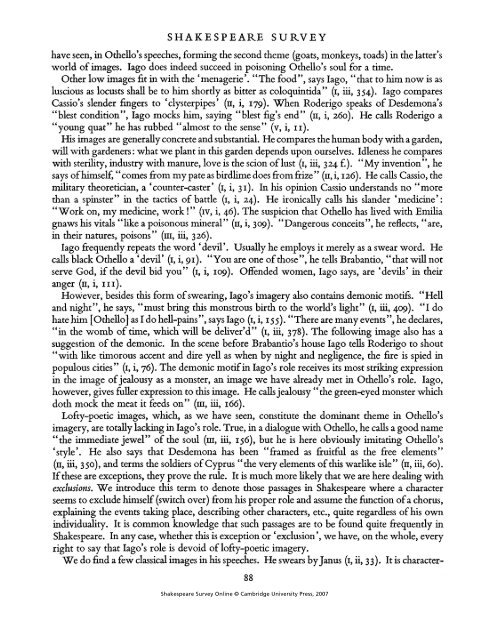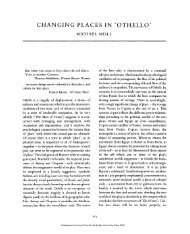the individualization of shakespeare's characters through imagery
the individualization of shakespeare's characters through imagery
the individualization of shakespeare's characters through imagery
Create successful ePaper yourself
Turn your PDF publications into a flip-book with our unique Google optimized e-Paper software.
SHAKESPEARE SURVEY<br />
have seen, in O<strong>the</strong>llo's speeches, forming <strong>the</strong> second <strong>the</strong>me (goats, monkeys, toads) in <strong>the</strong> latter's<br />
world <strong>of</strong> images. Iago does indeed succeed in poisoning O<strong>the</strong>llo's soul for a time.<br />
O<strong>the</strong>r low images fit in with <strong>the</strong> 'menagerie'. "The food", says Iago, "that to him now is as<br />
luscious as locusts shall be to him shortly as bitter as coloquintida" (i, iii, 354). Iago compares<br />
Cassio's slender fingers to 'clysterpipes' (n, i, 179). When Roderigo speaks <strong>of</strong> Desdemona's<br />
"blest condition", Iago mocks him, saying "blest fig's end" (n, i, 260). He calls Roderigo a<br />
"young quat" he has rubbed "almost to <strong>the</strong> sense" (v, i, 11).<br />
His images are generally concrete and substantial. He compares <strong>the</strong> human body with a garden,<br />
will with gardeners: what we plant in this garden depends upon ourselves. Idleness he compares<br />
with sterility, industry with manure, love is <strong>the</strong> scion <strong>of</strong> lust (1, iii, 324 f). "My invention", he<br />
says <strong>of</strong> himself, "comes from my pate as birdlime does from frize" (n,i, 126). He calls Cassio, <strong>the</strong><br />
military <strong>the</strong>oretician, a 'counter-caster' (1, i, 31). In his opinion Cassio understands no "more<br />
than a spinster" in <strong>the</strong> tactics <strong>of</strong> battle (1, i, 24). He ironically calls his slander 'medicine':<br />
"Work on, my medicine, work!" (iv, i, 46). The suspicion that O<strong>the</strong>llo has lived with Emilia<br />
gnaws his vitals "like a poisonous mineral" (n, i, 309). "Dangerous conceits", he reflects, "are,<br />
in <strong>the</strong>ir natures, poisons" (m, iii, 326).<br />
Iago frequently repeats <strong>the</strong> word 'devil'. Usually he employs it merely as a swear word. He<br />
calls black O<strong>the</strong>llo a 'devil' (1, i, 91). "You are one <strong>of</strong> those", he tells Brabantio, "that will not<br />
serve God, if <strong>the</strong> devil bid you" (1, i, 109). Offended women, Iago says, are 'devils' in <strong>the</strong>ir<br />
anger (n, i, in).<br />
However, besides this form <strong>of</strong> swearing, Iago's <strong>imagery</strong> also contains demonic motifs. "Hell<br />
and night", he says, "must bring this monstrous birth to <strong>the</strong> world's light" (1, iii, 409). "I do<br />
hate him [O<strong>the</strong>llo] as I do hell-pains", says Iago (1, i, 155). "There are many events", he declares,<br />
"in <strong>the</strong> womb <strong>of</strong> time, which will be deliver'd" (1, iii, 378). The following image also has a<br />
suggestion <strong>of</strong> <strong>the</strong> demonic. In <strong>the</strong> scene before Brabantio's house Iago tells Roderigo to shout<br />
"with like timorous accent and dire yell as when by night and negligence, <strong>the</strong> fire is spied in<br />
populous cities" (1, i, 76). The demonic motif in Iago's role receives its most striking expression<br />
in <strong>the</strong> image <strong>of</strong> jealousy as a monster, an image we have already met in O<strong>the</strong>llo's role. Iago,<br />
however, gives fuller expression to this image. He calls jealousy "<strong>the</strong> green-eyed monster which<br />
doth mock <strong>the</strong> meat it feeds on" (m, iii, 166).<br />
L<strong>of</strong>ty-poetic images, which, as we have seen, constitute <strong>the</strong> dominant <strong>the</strong>me in O<strong>the</strong>llo's<br />
<strong>imagery</strong>, are totally lacking in Iago's role. True, in a dialogue with O<strong>the</strong>llo, he calls a good name<br />
"<strong>the</strong> immediate jewel" <strong>of</strong> <strong>the</strong> soul (m, iii, 156), but he is here obviously imitating O<strong>the</strong>llo's<br />
'style'. He also says that Desdemona has been "framed as fruitful as <strong>the</strong> free elements"<br />
(n, iii, 350), and terms <strong>the</strong> soldiers <strong>of</strong> Cyprus "<strong>the</strong> very elements <strong>of</strong> this warlike isle" (n, iii, 60).<br />
If <strong>the</strong>se are exceptions, <strong>the</strong>y prove <strong>the</strong> rule. It is much more likely that we are here dealing with<br />
exclusions. We introduce this term to denote those passages in Shakespeare where a character<br />
seems to exclude himself (switch over) from his proper role and assume <strong>the</strong> function <strong>of</strong> a chorus,<br />
explaining <strong>the</strong> events taking place, describing o<strong>the</strong>r <strong>characters</strong>, etc., quite regardless <strong>of</strong> his own<br />
individuality. It is common knowledge that such passages are to be found quite frequently in<br />
Shakespeare. In any case, whe<strong>the</strong>r this is exception or 'exclusion', we have, on <strong>the</strong> whole, every<br />
right to say that Iago's role is devoid <strong>of</strong> l<strong>of</strong>ty-poetic <strong>imagery</strong>.<br />
We do find a few classical images in his speeches. He swears by Janus (1, ii, 33). It is character-<br />
88<br />
Shakespeare Survey Online © Cambridge University Press, 2007



